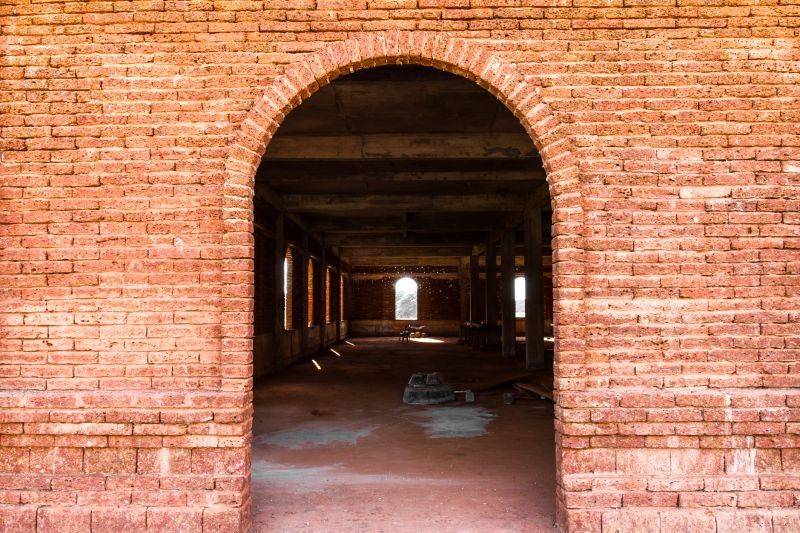Favorite Masonry Arch Repair Products For Lasting Fixes
Select trusted products that provide reliable solutions for restoring and maintaining masonry arch stability.
 Masonry arch repairs require careful selection of products that are compatible with historic and structural masonry. When undertaking such repairs, it is essential to use materials that match the original construction in appearance and performance, while also providing durability and stability. The process often involves assessing the extent of damage, cleaning the affected area, and applying appropriate repair compounds or mortars to restore the arch's integrity. Proper tools and materials ensure that repairs are both effective and minimally invasive, preserving the aesthetic and structural qualities of the original masonry.
Masonry arch repairs require careful selection of products that are compatible with historic and structural masonry. When undertaking such repairs, it is essential to use materials that match the original construction in appearance and performance, while also providing durability and stability. The process often involves assessing the extent of damage, cleaning the affected area, and applying appropriate repair compounds or mortars to restore the arch's integrity. Proper tools and materials ensure that repairs are both effective and minimally invasive, preserving the aesthetic and structural qualities of the original masonry.
Top Overall Option
Versatile Masonry Repair Mortar
A highly adaptable mortar designed for historic and structural masonry repairs, offering excellent adhesion, workability, and compatibility with traditional materials. It provides a reliable solution for restoring arches while maintaining aesthetic integrity and durability.
Types of Products For Masonry Arch Repairs
Hydraulic Cement for Cracks
Quick-setting cement suitable for filling cracks and small repairs in masonry arches, offering water resistance and strong adhesion.
Lime Mortar Mixes
Traditional lime-based mortars that allow for flexibility and breathability, ideal for historic masonry restoration.
Polyurethane Sealants
Elastic sealants used to seal joints and cracks, providing water resistance and accommodating movement.
Epoxy Resin Adhesives
High-strength adhesives for bonding and consolidating damaged masonry elements, suitable for structural repairs.
Repair Putty
Smooth, moldable compounds used for filling larger holes and surface imperfections in masonry surfaces.
Consolidants
Chemical treatments that penetrate and strengthen deteriorated masonry, helping to stabilize the structure.
Flexible Repair Mortars
Mortars with added flexibility to accommodate slight movements and prevent future cracking.
Waterproofing Sealants
Protective coatings that prevent water ingress and reduce deterioration caused by moisture.
Reinforcing Mesh
Metal or fiberglass mesh used to reinforce weak or cracked areas in masonry arches.
Cleaning and Preparation Solutions
Specialized cleaners to prepare masonry surfaces for repair, removing dirt, efflorescence, and loose material.
Grout for Masonry
Filling material used between bricks or stones to ensure stability and a uniform appearance.
Bonding Agents
Primers that improve adhesion between old masonry surfaces and new repair materials.
Expansion Joints
Components that allow for movement and expansion within masonry structures, preventing cracking.
Color-Matched Fillers
Pigmented compounds designed to blend seamlessly with existing masonry for aesthetic repairs.
Structural Grouts
High-strength grouts used to fill voids and support structural elements of masonry arches.
Popular Choices
Widely used for quick repairs in masonry structures, offering water resistance and ease of application.
Preferred for historic restoration projects due to their compatibility with traditional masonry materials.
Popular for sealing joints and cracks with flexibility and weather resistance.
Commonly chosen for bonding and consolidating masonry elements requiring high strength.
Versatile for filling larger surface imperfections and restoring appearance.
Effective for stabilizing deteriorated masonry and extending its lifespan.
Favored for their ability to accommodate slight movements in masonry structures.
Important for protecting repairs from moisture and preventing further damage.
Used for added support in weak or cracked areas, enhancing structural stability.
Essential for ensuring proper adhesion and surface readiness before repairs.
Commonly used for filling joints and supporting structural integrity.
Help improve adhesion between old and new masonry materials.
Help manage movement and prevent cracking in masonry arches.
Popular for aesthetic repairs that blend seamlessly with existing masonry.
Used to fill voids and reinforce structural elements effectively.
Advanced repair products include specialized mortars that are designed to match the physical and chemical properties of traditional masonry materials. These mortars typically feature a balanced mix of cement, lime, and fine aggregates, allowing for flexibility and breathability. In addition to mortars, epoxy resins are frequently used for structural bonding and crack filling, providing strong adhesion and stability. Sealants and consolidants are also important for protecting repaired areas from water ingress and further deterioration.
Preparation is key in masonry arch repairs. Cleaning the damaged area thoroughly to remove loose debris and deteriorated material creates a solid foundation for repair products. In some cases, reinforcing bars or mesh may be embedded to provide additional support. Once the area is prepared, applying the selected repair materials with proper techniques ensures a seamless integration with the existing masonry. Regular inspection and maintenance are recommended to prolong the lifespan of the repair work and maintain the structural safety of the arch.
Key Buying Considerations
- Compatibility with existing masonry materials to ensure seamless integration.
- Type of repair needed—whether it is structural, cosmetic, or sealing.
- Flexibility of the product to accommodate slight movements or expansion.
- Water resistance and weatherproofing capabilities for outdoor structures.
- Ease of application and working time to suit your repair process.
- Durability and longevity of the repair materials to minimize future maintenance.
- Color matching options for aesthetic consistency.
- Breathability of the repair product to prevent moisture buildup and deterioration.
- Strength and bonding capabilities for structural repairs.
- Preparation requirements for the masonry surface before applying products.
- Compatibility with historic or delicate masonry to avoid damage.
- Availability of reinforcement options like mesh or additional support materials.
- Environmental conditions during application, such as temperature and humidity.
- Cost considerations balanced with quality and longevity.
- Availability of technical support or instructions for best results.
